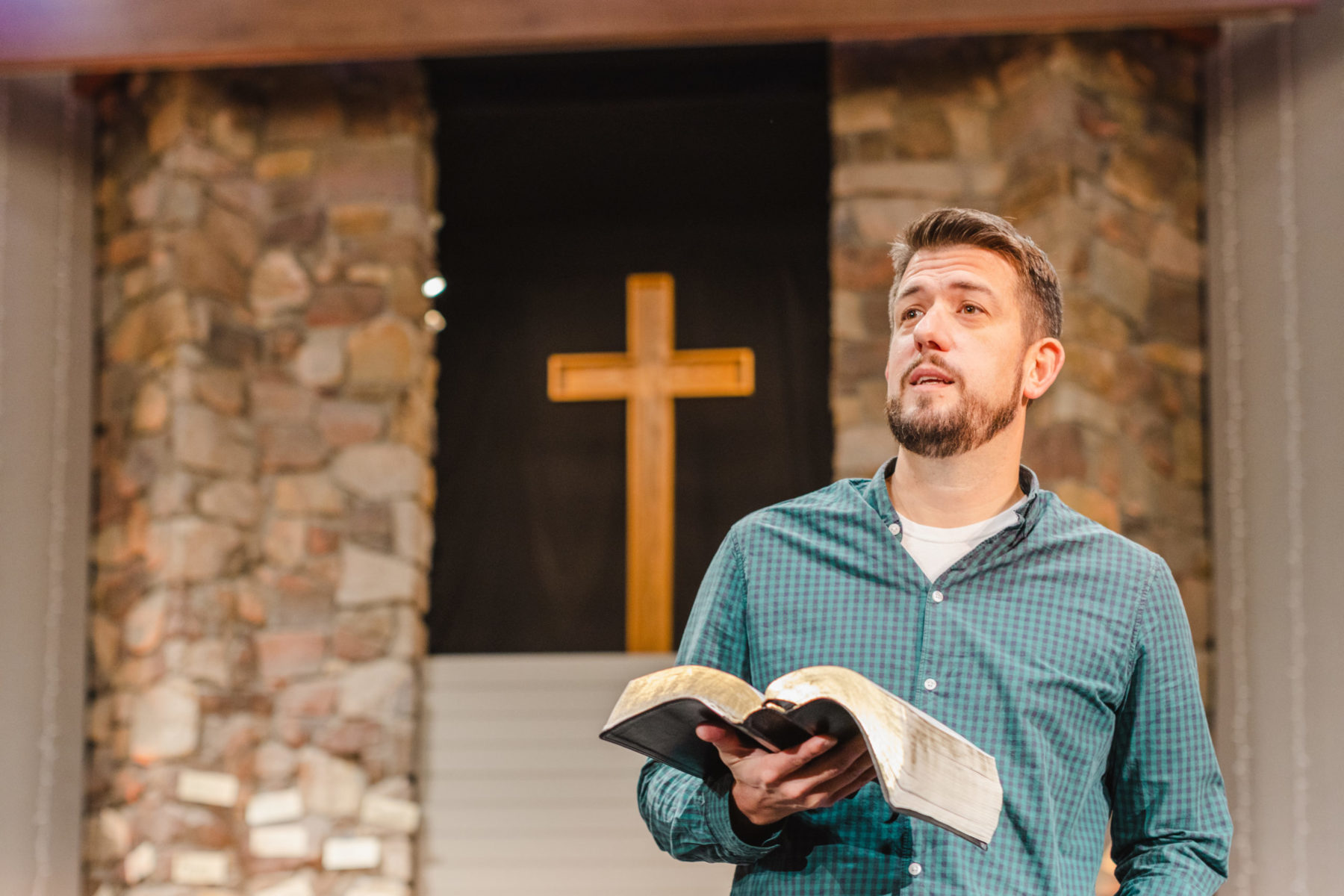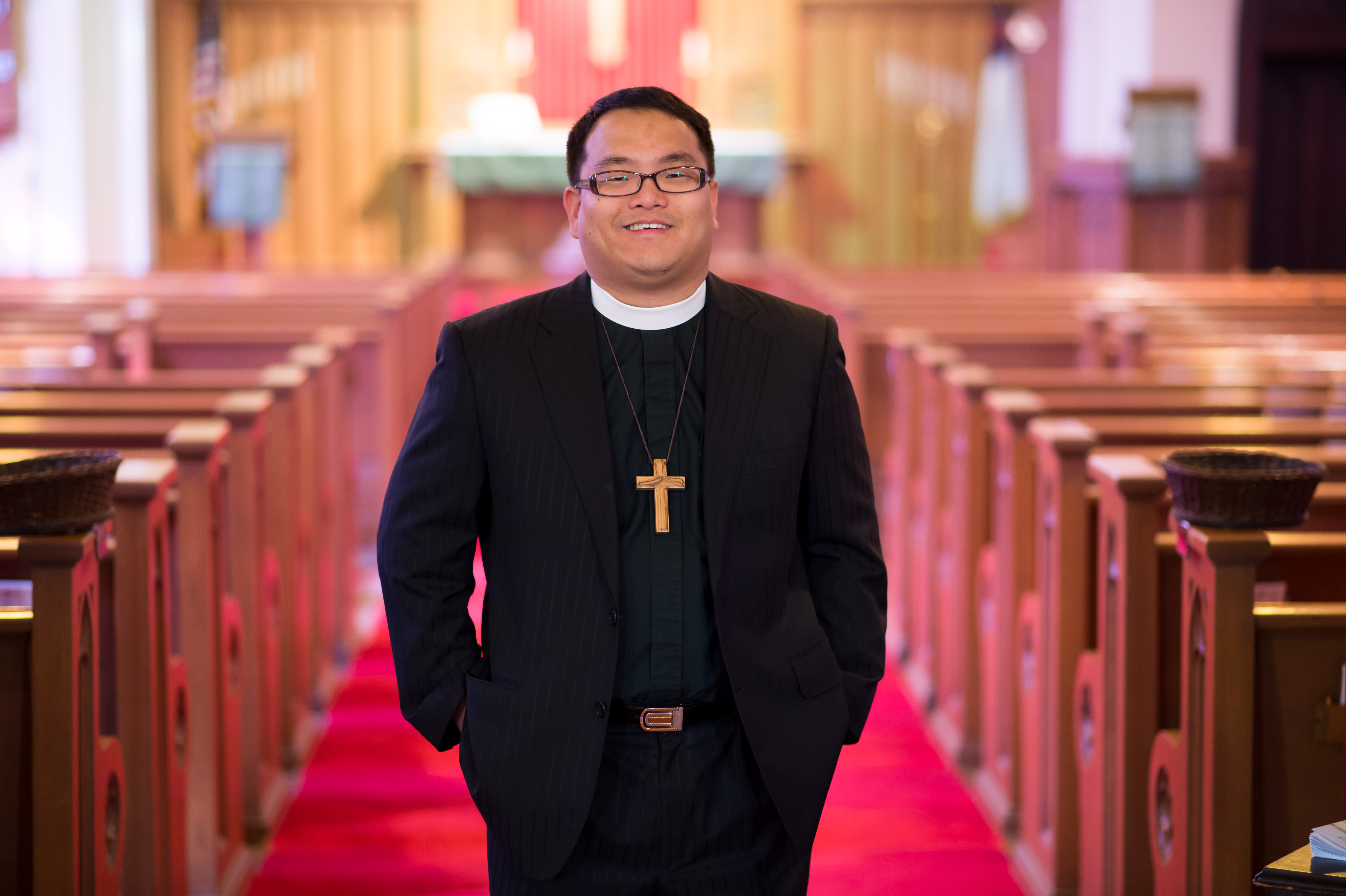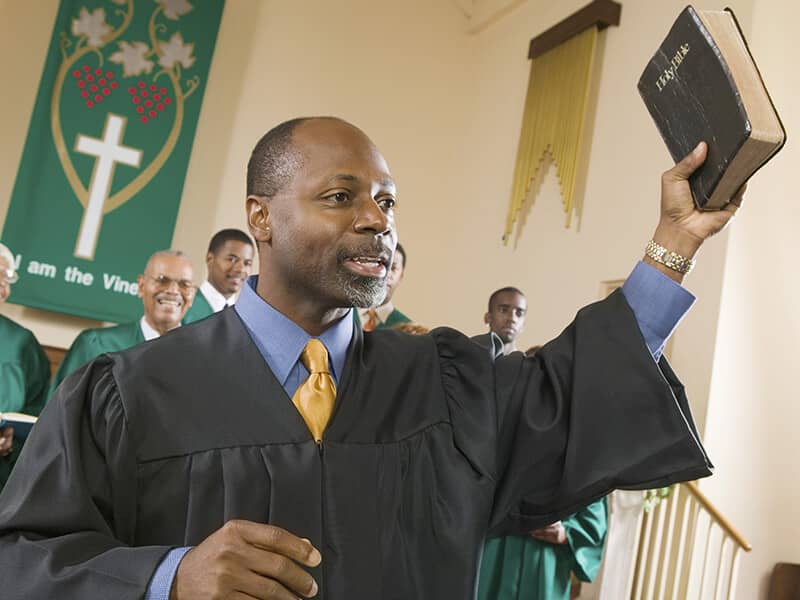Pastor Embezzles $200k, Buys Home - A Breach Of Trust
It’s a story that, in a way, really cuts deep into the heart of what faith communities are all about. Imagine a place where people gather, seeking comfort and guidance, giving what they can to support a shared purpose. Then, picture someone in a position of spiritual leadership, the very person trusted to uphold those values, reportedly taking a significant sum of money, a sum like two hundred thousand dollars, and using it for something as personal as a new place to live. This situation, as a matter of fact, highlights a profound betrayal, shaking the very foundations of communal trust and belief. It makes you wonder, doesn't it, about the ripple effects such actions can have on a group of people who have placed their faith, and their contributions, in someone else's hands.
The details, in some respects, paint a picture of a leader allegedly misusing funds intended for the community, possibly at a time when the congregation was quite vulnerable. Stories like these, you know, pop up from time to time, and they always bring up a lot of questions about accountability and the sacred bond between a spiritual guide and their followers. The idea that money meant for good works or church upkeep could instead be used for personal desires, like acquiring a residence, is truly upsetting for many who hear about it.
This kind of situation, actually, isn't just about the money; it's about the erosion of confidence and the hurt felt by those who believed in the mission and the people leading it. It prompts a closer look at the protective measures churches and other faith-based groups have in place, or perhaps lack, to keep such things from happening. The consequences for everyone involved, from the people who gave their hard-earned cash to the person accused of taking it, are often far-reaching and rather difficult to overcome.
Table of Contents
- The Shattering of Faith - When a Pastor Embezzles $200k, Buys Home
- How Does Such a Betrayal Come to Light? The Pastor Embezzles $200k, Buys Home Case
- The Ripple Effect - What Happens to the Congregation When a Pastor Embezzles $200k, Buys Home?
- Legal Ramifications and Accountability for a Pastor Who Embezzles $200k, Buys Home
- What Are the Consequences for a Pastor Who Embezzles $200k, Buys Home?
- Rebuilding Trust After a Pastor Embezzles $200k, Buys Home
- Preventing Future Incidents - Stopping a Pastor from Embezzling $200k and Buying a Home
- A Look at Similar Cases of a Pastor Who Embezzles $200k, Buys Home
The Shattering of Faith - When a Pastor Embezzles $200k, Buys Home
When someone in a position of spiritual leadership is accused of taking a large sum of money, say two hundred thousand dollars, and then using it to get a new residence, it really hits hard. This kind of event, you know, can leave a community feeling deeply hurt and rather confused. It's not just about the loss of funds; it's about the breaking of a sacred bond, the trust placed in a person meant to guide and serve. For many, a church is a sanctuary, a place where people find solace and support, and the idea that someone at the helm would misuse contributions is quite upsetting.
Consider the situation of a former assistant pastor in California. This individual, according to officials, was sentenced to two years in state prison for taking two hundred thousand dollars from his congregation. This happened, apparently, while the church's founder was nearing the end of his life, making the act seem even more callous. The money was reportedly spent on personal things, including a home. This truly illustrates the profound impact such actions have, not just on the finances of a group, but on the very spirit of its members. The community had given this money, presumably for the church's mission, and to learn it went elsewhere, for a personal dwelling, is a difficult pill to swallow.
The feeling of betrayal can linger for a very long time, affecting how people view their spiritual leaders and institutions in general. It's a stark reminder that even within places of worship, human failings can occur, and that vulnerability to such acts exists. This particular case, where a pastor embezzles $200k, buys home, really brings to light the importance of careful oversight and transparent handling of finances within any organization that relies on public contributions.
How Does Such a Betrayal Come to Light? The Pastor Embezzles $200k, Buys Home Case
You might wonder, how do these kinds of situations, like a pastor allegedly taking two hundred thousand dollars and using it to buy a home, actually get discovered? Often, it starts with a careful look at the financial records, perhaps by someone who notices something just a little off. Sometimes, it's an alert church treasurer or a dedicated board member who sees unusual spending patterns. For instance, one case involved a church treasurer who reportedly took over two hundred thousand dollars, spending it on things like tickets to a theme park and gambling. These are the kinds of activities that, naturally, raise eyebrows when they appear on a church's expense sheet.
In other instances, a former church secretary, like Melanie Ann Land, was accused of taking money from an Oxnard church. She reportedly made unauthorized purchases using church credit cards, buying personal items for her home and even paying for vacations. This sort of behavior, you know, eventually becomes visible, especially if there aren't strong checks and balances in place. The accumulation of these smaller, unauthorized expenditures can quickly add up to a significant sum, eventually leading to questions and, ultimately, investigations. The pathway to discovery for a pastor who embezzles $200k, buys home, often involves someone paying close attention to where the money is going.
Sometimes, it's a tip-off from someone within the community who has suspicions, or perhaps an external audit that uncovers discrepancies. The process of uncovering such acts can be slow and quite painful for everyone involved, but it's a necessary step to ensure accountability and to protect the integrity of the institution. The discovery of a pastor taking $200k and buying a home, or using it for other personal gain, is rarely a sudden revelation; it's often the result of persistent efforts to understand the financial flow.
The Ripple Effect - What Happens to the Congregation When a Pastor Embezzles $200k, Buys Home?
When news breaks that a spiritual leader has taken a large sum of money, perhaps two hundred thousand dollars, and used it for personal gain, like purchasing a residence, the impact on the congregation is, understandably, quite profound. There's a deep sense of shock, a feeling of being let down by someone they trusted implicitly. Many people contribute their hard-earned money out of devotion and a belief in the church's mission, so learning it was allegedly misused for a pastor who embezzles $200k, buys home, can feel like a personal affront.
The community might experience a period of mourning, not just for the lost funds, but for the loss of innocence and the disruption of their spiritual home. Some members might feel anger, while others might feel a profound sadness or even shame. This can lead to a decline in attendance, a decrease in contributions, and a general fracturing of the communal spirit. The bonds that held people together might loosen, as questions about leadership and trust come to the forefront. It's a very challenging time for everyone involved, truly.
Moreover, the incident can create a lasting stigma for the church itself, making it harder to attract new members or regain the confidence of those who left. The healing process is often long and requires significant effort from the remaining leadership and members to rebuild what was broken. The act of a pastor who embezzles $200k, buys home, extends far beyond the financial loss; it touches the very soul of the community it serves, leaving behind a trail of hurt and skepticism.
Legal Ramifications and Accountability for a Pastor Who Embezzles $200k, Buys Home
When a spiritual leader is accused of taking a substantial amount of money, say two hundred thousand dollars, and using it for personal things like a new dwelling, there are, naturally, serious legal consequences. These actions are not just moral failings; they are criminal offenses. For example, a former assistant pastor in California was sentenced to two years in state prison for taking two hundred thousand dollars from his congregation. This shows that the legal system does step in to address these kinds of financial misdeeds.
Curtis Lemons, for instance, faces time in prison and is expected to return the money, known as restitution, after being accused of taking two hundred thousand dollars from an Oxnard church and spending it on personal items. This means that beyond serving a sentence, individuals found guilty are often required to pay back the funds they allegedly took. This dual consequence of imprisonment and financial repayment is a common outcome in such cases, aiming to both punish the act and recover what was lost. The legal system seeks to hold the pastor who embezzles $200k, buys home, accountable for their actions.
In another instance, a couple in Calhoun, Melanie Ann Temple and Chad Lamar Temple, were charged with taking over two hundred ten thousand dollars from Belmont Baptist Church. Their arrest by Calhoun police highlights that these investigations can lead to formal charges and legal proceedings. The legal process can be quite involved, often including investigations, arrests, court appearances, and, ultimately, judgments that determine guilt and appropriate penalties. The aim is to ensure justice for the victims and to deter others from similar acts.
What Are the Consequences for a Pastor Who Embezzles $200k, Buys Home?
The consequences for a spiritual leader found to have taken a significant sum, like two hundred thousand dollars, and used it to acquire a new residence, are typically quite severe. Beyond the obvious legal penalties, such as time in prison, there are profound personal and professional repercussions. For instance, an Alabama woman was sentenced to five years in prison for wire fraud after being found guilty of taking more than two hundred thousand dollars from the church where she had worked for over a decade. This shows the seriousness with which these offenses are treated by the courts.
Willard Jones, a former executive director and pastor, pleaded guilty to taking nearly one million dollars, facing federal charges of taking funds, wire fraud, and tax fraud. This illustrates that the consequences can extend beyond just the initial act of taking money, encompassing other related financial crimes. The loss of one's reputation, professional standing, and personal freedom are all significant outcomes. The act of a pastor who embezzles $200k, buys home, leads to a complete upheaval of their life, and often, the lives of their family members.
Furthermore, the individual often faces public shame and condemnation, losing the respect and trust of the community they once served. The impact on their personal relationships can be devastating, and rebuilding a life after such an event is, practically, a monumental challenge. The financial restitution ordered by the courts can also mean a lifetime of debt and financial struggle. These consequences serve as a stark reminder of the serious nature of betraying the trust placed in a spiritual leader.
Rebuilding Trust After a Pastor Embezzles $200k, Buys Home
When a community has experienced the profound betrayal of a spiritual leader taking a large sum of money, perhaps two hundred thousand dollars, and using it for personal gain, like buying a home, the path to rebuilding trust is a very long and delicate one. It requires, actually, immense effort and transparency from the remaining leadership. The first step often involves openly addressing what happened, acknowledging the pain and hurt felt by the congregation, and clearly communicating the steps being taken to ensure such an event never happens again. This openness is crucial for healing.
Implementing stricter financial controls and oversight is another vital part of this process. This might include regular, independent audits, establishing clear policies for handling money, and creating committees with diverse members to review financial decisions. The goal is to show the congregation that new safeguards are firmly in place, helping to prevent another pastor who embezzles $200k, buys home, situation. It's about demonstrating a commitment to accountability and integrity, truly.
Beyond the practical steps, there's also the emotional and spiritual work of healing. This can involve counseling for affected members, sermons that address themes of forgiveness and restoration, and opportunities for the community to come together to process their feelings. Rebuilding trust is not just about fixing financial systems; it's about mending broken hearts and restoring faith, both in the institution and in each other. It’s a collective effort, and one that takes a lot of time and patience.
Preventing Future Incidents - Stopping a Pastor from Embezzling $200k and Buying a Home
To keep situations like a pastor taking two hundred thousand dollars and using it to buy a home from happening again, churches and other faith-based groups need to put some strong measures in place. One of the most important things is to have clear financial policies that everyone understands and follows. This means, you know, setting up a system where more than one person is always involved in handling money, approving expenses, and making payments. This way, no single individual has complete control over the funds.
Regular, independent financial reviews or audits are also incredibly important. Having an outside expert look at the books periodically can catch irregularities early on, before they grow into a major problem like a pastor who embezzles $200k, buys home. It adds an extra layer of protection and accountability. Training for staff and volunteers who handle money is also key, ensuring they understand best practices and the importance of financial integrity.
Moreover, fostering a culture of transparency within the church is vital. This means being open with the congregation about how money is being used, perhaps through regular financial reports or open meetings where members can ask questions. When people feel informed and included, they are more likely to notice if something seems amiss, and it creates an environment where financial misdeeds are less likely to occur. It’s about building a community where trust is earned through clear actions and shared responsibility.
A Look at Similar Cases of a Pastor Who Embezzles $200k, Buys Home
The situation of a spiritual leader taking a large sum of money, like two hundred thousand dollars, and using it for personal gain, such as acquiring a new residence, is unfortunately not an isolated incident. There have been other cases that, in some respects, echo this pattern, highlighting the ongoing challenge of financial oversight within religious organizations. For example, a pastor in Washington state was accused of orchestrating a twenty-five million dollar scheme involving cryptocurrency, reportedly defrauding over fifteen hundred investors. While the amount is much larger, the core issue of a leader misusing their position for personal financial benefit remains the same.
Another instance involved a West Tulsa pastor accused of taking nearly one million dollars from his own congregation. And, you know, a Washington pastor pleaded innocent to allegations of wire fraud after being accused of taking almost six million dollars belonging to church members. These cases, while varying in scale and specific methods, underscore a recurring theme: individuals in positions of trust allegedly diverting funds meant for communal or spiritual purposes into their own pockets. The common thread is a breach of the faith placed in them, regardless of whether the specific outcome was a pastor who embezzles $200k, buys home, or something else entirely.
The details vary, from unauthorized credit card purchases for personal items and vacations, as seen with a former church secretary who was accused of taking money, to larger, more complex financial schemes. What these different scenarios share is the profound impact on the communities involved, the legal consequences for those found responsible, and the difficult process of rebuilding trust and ensuring future protection. They serve as a powerful reminder that vigilance and accountability are essential in all organizations, especially those built on faith and shared contributions.
This article has explored the concerning issue of a pastor taking a significant sum of money, like two hundred thousand dollars, and using it to buy a home. We've looked at the deep sense of betrayal felt by congregations, how such acts come to light through careful financial review, and the serious legal and personal consequences faced by those found responsible. We also discussed the vital steps communities must take to rebuild trust and implement stronger financial safeguards to prevent similar incidents from happening again. Finally, we touched upon other instances where spiritual leaders have allegedly misused funds, underscoring the importance of vigilance in all faith-based organizations.

Are Pastors Called To Shepherd

Pastor

Why We Should Stop Seeing Our Pastors as Perfect | Mistakes by Church